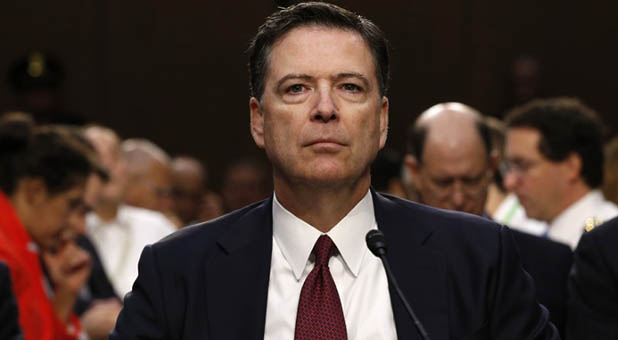James Comey’s Testimony Proved He’s a Danger to Constitutional Government
Fired FBI Director James Comey’s statement was a devastating indictment of the central figure in the investigation of alleged collusion between the Trump campaign and the Russians.
James Comey.
And there was one line in that testimony that summed up everything you need to know about James Comey, why he was fired and why he was such a danger to constitutional government:
The FBI’s traditionally independent status in the executive branch.
The last time we checked, according to the Constitution there is only one head of the executive branch—the president of the United States—and every executive branch official and agency is inferior to him and controlled by him.
That makes the FBI not a “traditionally independent” part of the executive branch, but at best a sub-Cabinet division of the Department of Justice.
And the statute that governs the appointment of the FBI Director makes it clear that the director serves at the pleasure of the president, not (much as the Democrats and the media would like to think otherwise) independent of presidential authority.
See William Chesney’s concise explanation of the governing law through this link.
What that one line in Comey’s statement says is that he considered himself above the president, and above the Constitution as the law that governs government, and was in his own mind an independent prosecutor, judge and jury using the power of the FBI to indict and imprison, or defame and bankrupt, those he arbitrarily and capriciously chose as his targets.
This is not only wrong as a matter of constitutional law and practice, it is an existential threat to constitutional liberty to grant such power to one man.
But it is, as our friends at the Federalist remind us, “a Beltway game” Comey was playing with the president and the various targets of the investigation, particularly retired Lt. Gen. Mike Flynn.
The “Beltway game,” as explained by Sean Davis and Millie Hemingway, is his admission that he deliberately refused to inform the public that Trump was not being personally investigated by the FBI. Comey’s justification for this refusal to publicly disclose material facts—that those facts might change — is laughable, especially in light of Comey’s 2016 two-step regarding the investigation of Hillary Clinton.
While the revelation of Comey’s self-aggrandizement and scorn of the Constitution is damning, Comey also revealed himself to be the worst kind of worm-like bureaucratic careerist.
According to his own testimony, notes Sean Davis, Comey repeatedly told the president that the FBI was not investigating him. That’s exactly what you’d expect from a careerist looking to keep his job. It’s why Comey, in his own tortured words, pledged “honest loyalty” to Trump during a private meeting.
If the conversation with Trump had really bothered Comey all that much, observed Davis, he would’ve walked out and quit on the spot. Instead, he did what all ambitious bureaucrats eager to keep their jobs do: he stayed, he pledged his loyalty, and he went home and wrote up a self-serving CYA memo just in case. Here’s how Comey describes what happened:
[Trump] then said, “I need loyalty.” I replied, “You will always get honesty from me.” He paused and then said, “That’s what I want, honest loyalty.” I paused, and then said, “You will get that from me.” As I wrote in the memo I created immediately after the dinner, it is possible we understood the phrase “honest loyalty” differently, but I decided it wouldn’t be productive to push it further.
What better way to insure yourself against being fired than to give the impression that you are overseeing a grave investigation of potential wrongdoing by your boss asked Davis?
Unfortunately for Comey, Trump had no intention of playing that game and dancing that dance.
Comey’s own words reveal in lurid detail the game he was playing concluded Davis. They reveal that Trump’s claims about the investigation, and his claims about Comey’s characterization of the investigation, were completely accurate. They reveal that Comey was giving one impression to the president and Congress in private and deliberately allowing an entirely different one to gain currency in public. Comey’s mistake wasn’t in thinking the Beltway two-step was the best way to keep his job. His mistake was assuming that Trump wouldn’t dare to stop dancing.
What really happened in Sean Davis’ analysis, and we agree, is that Trump was wise to Comey’s con and finally had enough of it. He figured out what Comey was doing—deliberately refusing to correct a factually inaccurate impression of the FBI’s ongoing investigation as a means of protecting his job—and called his bluff. {eoa}
This article was originally published at ConservativeHQ.com. Used with permission.















































